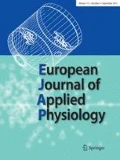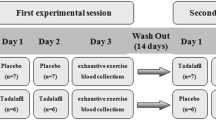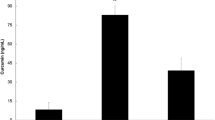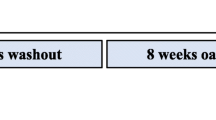Abstract
To investigate the effects of allicin supplementation on exercise-induced muscle damage (EIMD), interleukin-6 (IL-6), and antioxidative capacity, a double-blinded, placebo-controlled study was conducted in well-trained athletes. Subjects were randomly assigned to an allicin supplementation group (AS group) and a control group, and received either allicin or placebo for 14 days before and 2 days after a downhill treadmill run. Plasma creatine kinase (CK), muscle-specific creatine kinase (CK-MM), lactate dehydrogenase (LDH), IL-6, superoxide dismutase (SOD), total antioxidative capacity (TAC), and perceived muscle soreness were measured pre and post exercise. AS group had significantly lower plasma levels of CK, CK-MM and IL-6, and reduced perceived muscle soreness after exercise, when compared with the control group. AS group also demonstrated a trend toward reducing plasma concentration of LDH after exercise (P = 0.08), although not statistically significant. Allicin supplementation induced a higher value of TAC at rest, and this higher value was maintained 48 h after exercise, however, there was no difference in SOD values after exercise between the two groups. The results suggested that allicin might be a potential agent to reduce EIMD. Further studies concerning anti-inflammatory and anti-oxidative effects of allicin on EIMD are needed.




Similar content being viewed by others
References
Amagase H, Petesch BL, Matsuura H, Kasuga S, Itakura Y (2001) Intake of garlic and its bioactive components. J Nutr 131:955S–962S
Amagase H (2006) Clarifying the real bioactive constituents of garlic. J Nutr 136:716S–725S
Aoi W, Naito Y, Takanami Y, Kawai Y, Sakuma K, Ichikawa H, Yoshida N, Yoshikawa T (2004) Oxidative stress and delayed-onset muscle damage after exercise. Free Radic Biol Med 37:480–487
Augusti KT, Mathew PT (1975) Effect of allicin on certain enzymes of liver after a short term feeding to normal rats. Experientia 31:148–149
Borg G (1998) Perceived exertion and pain scale. Human Kinetics, Champaign
Brown SJ, Child RB, Day SH, Donnelly AE (1997) Indices of skeletal muscle damage and connective tissue breakdown following eccentric muscle contractions. Eur J Appl Physiol Occup Physiol 75:369–374
Clarkson PM, Hubal MJ (2002) Exercise-induced muscle damage in humans. J Phys Med Rehabil 81:S52–69
Davis JM, Murphy EA, Carmichael MD, Zielinski MR, Groschwitz CM, Brown AS, Gangemi JD, Ghaffar A, Mayer EP (2007) Curcumin effects on inflammation and performance recovery following eccentric exercise-induced muscle damage. J Physiol Regul Integr Comp Physiol 292:R2168–73
Feng R, He W, Ochi H (2001) A new murine oxidative stress model associated with senescence. Mech Ageing Dev 122:547–559
Gleeson M (2000) Interleukins and exercise. J Physiol 529(Pt 1):1
Gleeson M, Bishop NC (2000) Special feature for the Olympics: effects of exercise on the immune system: modification of immune responses to exercise by carbohydrate, glutamine and anti-oxidant supplements. Immunol Cell Biol 78:554–561
Hargreaves M (2004) Muscle glycogen and metabolic regulation. Proc Nutr Soc 63:217–220
Hasan N, Yusuf N, Toossi Z, Islam N (2006) Suppression of Mycobacterium tuberculosis induced reactive oxygen species (ROS) and TNF-alpha mRNA expression in human monocytes by allicin. FEBS Lett 580:2517–2522
Hasan N, Siddiqui MU, Toossi Z, Khan S, Iqbal J, Islam N (2007) Allicin-induced suppression of Mycobacterium tuberculosis 85B mRNA in human monocytes. Biochem Biophys Res Commun 355:471–476
Helge JW, Stallknecht B, Pedersen BK, Galbo H, Kiens B, Richter EA (2003) The effect of graded exercise on IL-6 release and glucose uptake in human skeletal muscle. J Physiol 546(Pt 1):299–305
Hilbert JE, Sforzo GA, Swensen T (2003) The effects of massage on delayed onset muscle soreness. Br J Sports Med 37:72–75
Hyatt JP, Clarkson PM (1998) Creatine kinase release and clearance using MM variants following repeated bouts of eccentric exercise. Med Sci Sports Exerc 30:1059–1065
Judge AR, Dodd SL (2003) Oxidative damage to skeletal muscle following an acute bout of contractile claudication. Atherosclerosis 171:219–224
Kendall B, Eston R (2002) Exercise-induced muscle damage and the potential protective role of estrogen. Sports Med 32:103–123
Lawson LD, Gardner CD (2005) Composition, stability, and bioavailability of garlic products used in a clinical trial. J Agric Food Chem 53:6254–6261
Li JX, Tong CW, Xu DQ, Chan KM (1999) Changes in membrane fluidity and lipid peroxidation of skeletal muscle mitochondria after exhausting exercise in rats. Eur J Appl Physiol 80:113–117
Liu CT, Sheen LY, Lii CK (2007) Does garlic have a role as an antidiabetic agent? Mol Nutr Food Res 51:1353–1364
Lu HK, Hsieh CC, Hsu JJ, Yang YK, Chou HN (2006) Preventive effects of Spirulina platensis on skeletal muscle damage under exercise-induced oxidative stress. Eur J Appl Physiol 98:220–226
MacIntyre DL, Reid WD, McKenzie DC (1995) Delayed muscle soreness. The inflammatory response to muscle injury and its clinical implications. Sports Med 20:24–40
Makris A, Thornton CE, Xu B, Hennessy A (2005) Garlic increases IL-10 and inhibits TNF alpha and IL-6 production in endotoxin-stimulated human placental explants. Placenta 26:828–834
Mathew PT, Augusti KT (1973) Studies on the effect of allicin (diallyl disulphide-oxide) on alloxan diabetes. I. Hypoglycaemic action and enhancement of serum insulin effect and glycogen synthesis. Indian J Biochem Biophys 10:209–212
Mo SJ, Son EW, Rhee DK, Pyo S (2003) Modulation of TNF-alpha-induced ICAM-1 expression, NO and H2O2 production by alginate, allicin and ascorbic acid in human endothelial cells. Arch Pharm Res 26:244–251
Nieman DC, Dumke CL, Henson DA, McAnulty SR, Gross SJ, Lind RH (2005) Muscle damage is linked to cytokine changes following a 160-km race. Brain Behav Immun 19:398–403
Nishimoto N, Kishimoto T (2006) Interleukin 6: from bench to bedside. Nat Clin Pract Rheumatol 2:619–626
Okada Y, Tanaka K, Sato E, Okajima H (2006) Kinetic and mechanistic studies of allicin as an antioxidant. Org Biomol Chem 4:4113–4117
Peake JM, Suzuki K, Hordern M, Wilson G, Nosaka K, Coombes JS (2005a) Plasma cytokine changes in relation to exercise intensity and muscle damage. Eur J Appl Physiol 95:514–521
Peake J, Nosaka K, Suzuki K (2005b) Characterization of inflammatory responses to eccentric exercise in humans. Exerc Immunol Rev 11:64–85
Pedersen BK, Steensberg A, Fischer C, Keller C, Keller P, Plomgaard P, Febbraio M, Saltin B (2003) Searching for the exercise factor: is IL-6 a candidate? J Muscle Res Cell Motil 24:113–119
Pedersen BK, Fischer CP (2007) Physiological roles of muscle-derived interleukin-6 in response to exercise. Curr Opin Clin Nutr Metab Care 10:265–271
Petersen EW, Ostrowski K, Ibfelt T, Richelle M, Offord E, Halkjaer-Kristensen J, Pedersen BK (2001) Effect of vitamin supplementation on cytokine response and on muscle damage after strenuous exercise. Am J Physiol Cell Physiol 280:C1570–1575
Pizza FX, Cavender D, Stockard A, Baylies H, Beighle A (1999) Anti-inflammatory doses of ibuprofen: effect on neutrophils and exercise-induced muscle injury. Int J Sports Med 20:98–102
Prasad K, Laxdal VA, Yu M, Raney BL (1995) Antioxidant activity of allicin, an active principle in garlic. Mol Cell Biochem 148:183–189
Proske U, Morgan DL (2001) Muscle damage from eccentric exercise: mechanism, mechanical signs, adaptation and clinical applications. J Physiol 537:333–345
Rivlin RS (2001) Historical perspective on the use of garlic. J Nutr 131:951S–954S
Rodenburg JB, de Boer RW, Schiereck P, van Echteld CJ, Bär PR (1994) Changes in phosphorus compounds and water content in skeletal muscle due to eccentric exercise. Eur J Appl Physiol Occup Physiol 68:205–213
Savage KJ, Clarkson PM (2002) Oral contraceptive use and exercise-induced muscle damage and recovery. Contraception 66:67–71
Sela U, Ganor S, Hecht I, Brill A, Miron T, Rabinkov A, Wilchek M, Mirelman D, Lider O, Hershkoviz R (2004) Allicin inhibits SDF-1alpha-induced T cell interactions with fibronectin and endothelial cells by down-regulating cytoskeleton rearrangement, Pyk-2 phosphorylation and VLA-4 expression. Immunology 111:391–399
Sjödin B, Hellsten Westing Y, Apple FS (1990) Biochemical mechanisms for oxygen free radical formation during exercise. Sports Med 10:236–254
Sobenin IA, Nedosugova LV, Filatova LV, Balabolkin MI, Gorchakova TV, Orekhov AN (2007). Metabolic effects of time-released garlic powder tablets in type 2 diabetes mellitus: the results of double-blinded placebo-controlled study. Acta Diabetol 45(1):1–6, (Epub ahead of print)
Son EW, Mo SJ, Rhee DK, Pyo S (2006) Inhibition of ICAM-1 expression by garlic component, allicin, in gamma-irradiated human vascular endothelial cells via downregulation of the JNK signaling pathway. Int Immunopharmacol 6:1788–1795
Steensberg A, van Hall G, Osada T, Sacchetti M, Saltin B, Klarlund Pedersen B (2000) Production of interleukin-6 in contracting human skeletal muscles can account for the exercise-induced increase in plasma interleukin-6. J Physiol 529(Pt 1):237–242
Stouthard JM, Romijn JA, Van der Poll T, Endert E, Klein S, Bakker PJ, Veenhof CH, Sauerwein HP (1995) Endocrinologic and metabolic effects of interleukin-6 in humans. Am J Physiol 268(5 Pt 1):E813–819
Tokmakidis SP, Kokkinidis EA, Smilios I, Douda H (2003) The effects of ibuprofen on delayed muscle soreness and muscular performance after eccentric exercise. J Strength Cond Res 17:53–59
Uchiyama S, Tsukamoto H, Yoshimura S, Tamaki T (2006) Relationship between oxidative stress in muscle tissue and weight-lifting-induced muscle damage. Pflugers Arch 452:109–116
van de Stolpe A, van der Saag PT (1996) Intercellular adhesion molecule-1. J Mol Med 74:13–33
Volfinger L, Lassourd V, Michaux JM, Braun JP, Toutain PL (1994) Kinetic evaluation of muscle damage during exercise by calculation of amount of creatine kinase released. Am J Physiol 266:R434–441
Woodward PW (1996) Garlic and friends. The history, growth and use of edible alliums. Hyland House, Melbourne, pp 2–22
Xiao H, Parkin KL (2002) Antioxidant functions of selected allium thiosulfinates and S-alk(en)yl-L-cysteine sulfoxides. J Agric Food Chem 50:2488–2493
Zhang XH, Lowe D, Giles P, Fell S, Connock MJ, Maslin DJ (2001) Gender may affect the action of garlic oil on plasma cholesterol and glucose levels of normal subjects. J Nutr 131:1471–1478
Author information
Authors and Affiliations
Corresponding authors
Rights and permissions
About this article
Cite this article
Su, QS., Tian, Y., Zhang, JG. et al. Effects of allicin supplementation on plasma markers of exercise-induced muscle damage, IL-6 and antioxidant capacity. Eur J Appl Physiol 103, 275–283 (2008). https://doi.org/10.1007/s00421-008-0699-5
Accepted:
Published:
Issue Date:
DOI: https://doi.org/10.1007/s00421-008-0699-5




